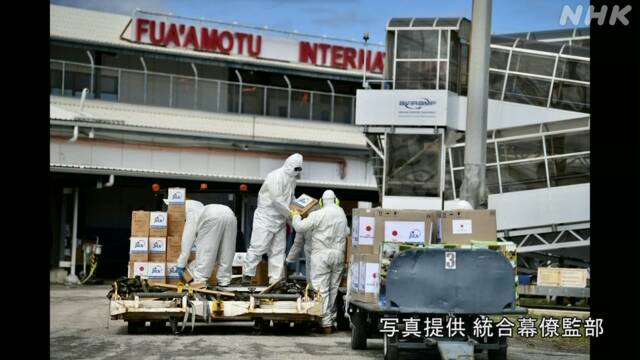It has been 15 days and a month since the large-scale eruption of a submarine volcano off the coast of Tonga, an island country in the South Pacific Ocean.
Infection with the new coronavirus is spreading locally, affecting support for people affected by the disaster.
A large-scale eruption of a submarine volcano on January 15 killed four people and destroyed many buildings after the Tongan government announced that it had flooded with a tsunami of up to 15 meters.
The World Bank announced on the 14th that the damage caused by the tsunami and volcanic ash is estimated to be 90.4 million dollars, which is about 10.4 billion yen in Japanese yen, which is equivalent to 18.5% of Tonga's GDP = gross domestic product.
The impact on the tourism industry is not included in this estimate, and the amount of loss is expected to increase in the future.
Furthermore, in Tonga, since the first confirmed community-acquired infection of the new corona on February 1, 139 people have been confirmed to be infected by the 14th, and in Tonga, where the capital is located, going out is severely restricted. "Down" has been going on for almost two weeks.
"Many people are still affected by volcanic ash and need drinking water, but they are working to combat infection," Mau, Deputy Secretary of State for Disaster Management in Tonga, said in a telephone interview with NHK on the 14th. The number of people is kept to a minimum, and it is difficult to deliver support promptly. "
Self-Defense Forces Deliver relief supplies such as drinking water and high-pressure washers
The Ministry of Defense dispatches Air Self-Defense Force transport aircraft and Maritime Self-Defense Force vessels to deliver relief supplies to Tonga.
Two C130 transport planes of the Japan Air Self-Defense Force entered Tonga four times from January 22 to February 2, and included about 10 tons of drinking water, as well as high-pressure washers and goggles used to remove volcanic ash. It was delivered.
In addition, the Maritime Self-Defense Force's transport ship "Osumi", which departed from the base in Kure City, Hiroshima Prefecture on January 24, arrived in Tonga on February 9, delivering drinking water, high-pressure washers, rear cars, scoops, etc. I did.
The transport ship decided to deliver relief supplies to the remote islands of Tonga, and on the 14th, it was said that the onboard Ground Self-Defense Force CH47 helicopter was used to bring drinking water to Eua Island.
We plan to deliver drinking water to other remote islands in the future.
Japanese NGOs support activities
In Tonga, Japanese NGOs are struggling to prevent the spread of infection and to support disasters at the same time.
Peace Winds Japan, an NGO headquartered in Hiroshima Prefecture and has a track record of support activities in more than 30 countries, drinks water based on donations of more than 30 million yen collected on the Internet. We procured the purifying agents to make, ▼ masks, and foodstuffs such as rice and sugar.
Then, three staff members were dispatched to Fiji, a neighboring country of Tonga, and on the 14th, they started an activity to transport relief supplies from Fiji to Tonga using a small aircraft.
In the footage shot at Faamotu International Airport in Tonga, all airport staff wore protective clothing to prevent infection, ▼ guiding small aircraft and ▼ transporting supplies.
It is the policy of the Tongan government that NGO staff cannot leave the airport grounds and must return to Fiji immediately after handing over supplies and refueling.
After being quarantined, the relief supplies will be received by the person in charge of the local NGO that works with them.
For the time being, Peace Winds Japan will use small aircraft and ships to transport relief supplies, collect information on damage to the surrounding remote islands, and consider medium- to long-term support such as the restoration of agricultural land damaged by volcanic ash. I'm going to do it.

